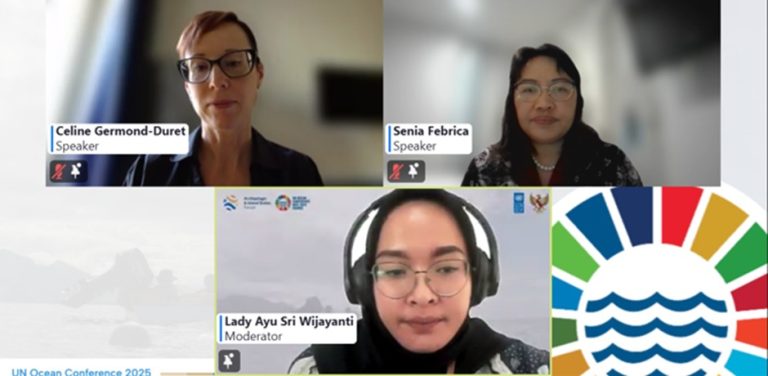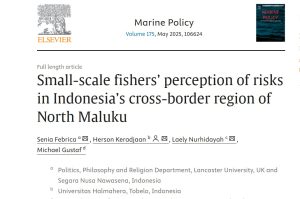
The UN Development Programme Archipelagic and Island States (AIS) Forum led side-event ‘Bridging Local Wisdom and Innovation for Coastal Communities Resilience’ organised on 10 June 2025 explored how bridging local and traditional knowledge with scientific and technological innovation can strengthen climate resilience in coastal and island communities—while advancing sustainable ocean-based livelihoods and inclusive development.
Researchers and practitioners working on adaptation strategies in Fiji, Vanuatu, Dominica, St. Vincent and the Grenadines, Indonesia and UK shared findings on traditional knowledge systems, multidimensional adaptation tools, and community-driven resilience frameworks. By fostering scientific cooperation and knowledge exchange, this dialogue event aimed to advance inclusive, locally grounded, and scalable solutions that reinforce the science-policy interface for coastal communities’ resilience—a key priority of SDG 14 and the UNOC 2025 agenda.
Dr. Allanson Cruickshank, University of Malta, shared findings and experience from his research in Dominica and Saint Vincent and the Grenadines to increase communities’ resilience against disasters. Dr Cruickshank highlighted the importance of combining community-based disaster risk reduction (CBDRR) and community-based adaptation (CBA) in response to both volcanic hazards and climate change in small island developing states (SIDS).
Prof. Shaista Shameem, Vice Chancellor, the University of Fiji stressed the role of traditional and local knowledge in climate change mitigation and adaptation in coastal villages of Fiji and Vanuatu. Prof Shameem recommended for traditional knowledge to be institutionalized in national and regional climate related-policies and legislation.
Dr Celine Germond-Duret and Dr Senia Febrica presentation on ‘Blue Economy and Climate Resilience’ noted that acceleration in blue economy activities has often brought injustices to ocean-dependent economies such as dispossession, displacement, pollution and waste (Germond-Duret et al., 2023; Germond-Duret et al., 2022). Based on this knowledge, Dr Germond-Duret and Dr Febrica urged stakeholders to place communities at the heart of climate-resilient blue economy pathways including in co-designing trajectories, strategies, choices and actions.
Some of the key messages highlighted by delegates at the side-event include the importance to:
- combine community-based disaster risk reduction and community-based adaptation in response to climate hazards and disasters in small island developing states.
- formally recognized and institutionalized traditional knowledge in national and regional climate related-policies and legislation.
- enact law to safeguard traditional practices and knowledge
- integrate traditional knowledge with modern science.
- establish community-science partnerships and research to document and validate traditional knowledge alongside modern techniques
- recognize the negative impacts of blue economy projects on coastal communities
- place communities at the heart of climate-resilient blue economy pathways including in co-designing trajectories, strategies, choices and actions.
- understand that while climate change is a global phenomenon, its impacts are felt locally by communities
- conduct local risks/vulnerabilities assessment to understand communities’ perception of risks posed by climate change; risks adaptation measures that have been implemented; local knowledge (e.g. related to weather, ocean currents and winds patterns); coordination gap between various entities; and types of information and capacity building initiatives needed.
The event was co-organised by the UNDP AIS in collaboration with Lancaster University and the University of Fiji.

